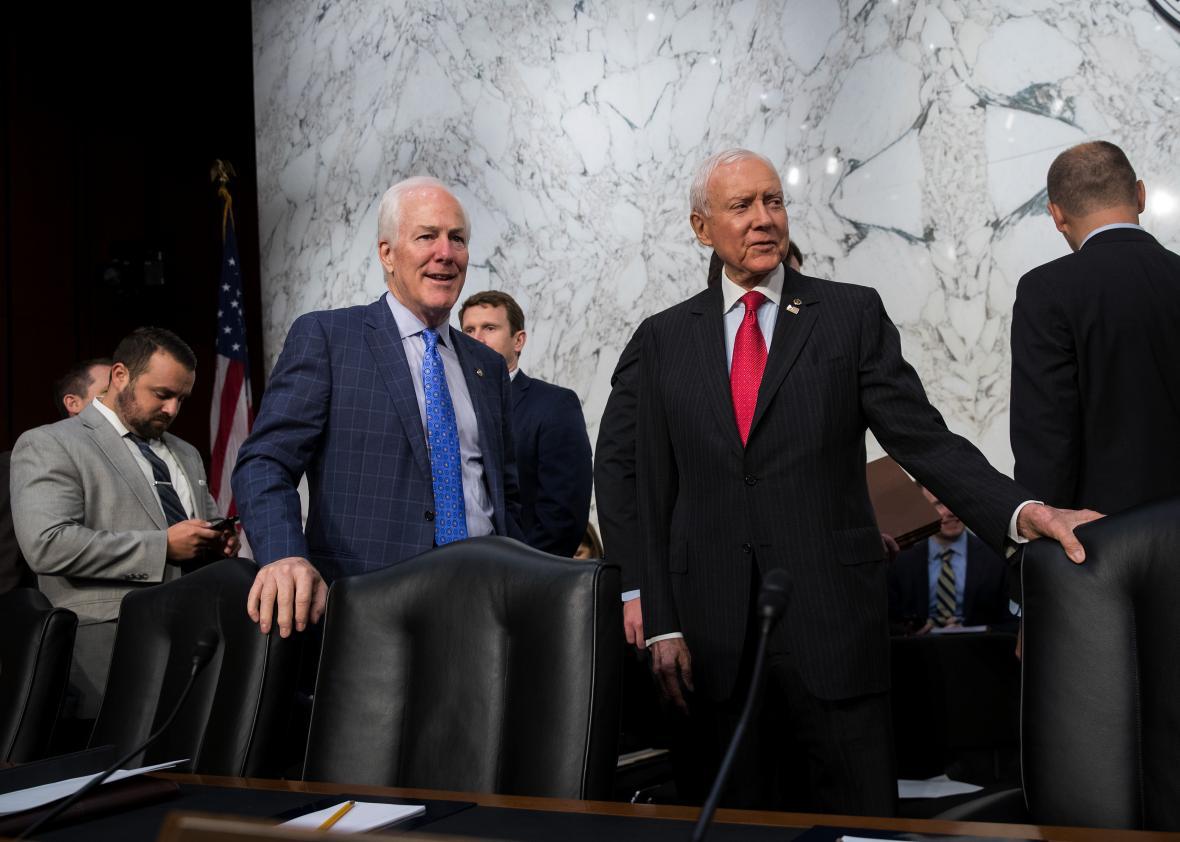President Trump, to put it nicely, has never cared for special counsel Robert Mueller’s broad-ranging investigation of possible Russian collusion with his presidential campaign. He has already fired one FBI director investigating the matter, and over the summer, he tried to shame his attorney general, Jeff Sessions, into resigning over his recusal from the probe. On Monday, Trump was reportedly fuming over the first round of indictments and pleas, which snared former Trump campaign chair Paul Manafort and former campaign adviser George Papadopoulos, and the indictments seemed to increase the odds that Trump might fire Mueller before he could complete his work.
Is it time for Congress, then, to do something to pre-emptively protect the special counsel? Republican senators on Monday afternoon were incredulous at the suggestion that Trump would even think of doing something so rash.
“Well, I don’t think he would,” said Oklahoma Sen. Jim Inhofe, who noted that the indictments, so far, don’t reveal the president’s involvement in anything. (“In the meantime,” he added, “don’t forget we still have all the Hillary activity.”)
Senate Majority Whip John Cornyn, when asked whether Congress needed to pass a law to insulate Mueller from termination, noted that the special counsel has his own “lane”—to investigate criminal activity—while the Senate inquiry is strictly concerned with security against Russian “active measures.” But should Congress shield Mueller from a firing?
“I think [Mueller] knows what he’s doing, and he’s doing it,” Cornyn told reporters. All right.
Utah Sen. Orrin Hatch was the only senator I spoke to—maybe the only person in Washington—who seemed genuinely shocked that a shadowy operator like Paul Manafort could be facing legal trouble.
“I do know Paul Manafort,” Hatch told me. “I can’t say I’ve had anything to do with him for years, but I’d be surprised if Paul broke any laws.” When I asked him what his reaction would be if Trump fired Mueller, Hatch said that “the president has the right to do that. I don’t think he will do that.” (Hatch’s office later cleaned up with a statement noting that “these are serious charges, and I believe that it’s in the best interest for all parties involved to allow Bob Mueller to conduct a full and vigorous investigation.”)
Arkansas Sen. Tom Cotton, who rarely speaks to reporters in the hallway, opened up to field questions about his effort to repeal the Affordable Care Act’s individual mandate in the tax reform bill. After a couple minutes, a reporter offered a question about the indictments. The reporter could barely finish the question before Cotton said “no comment.”
Earlier in the afternoon, the chairman of the Senate Judiciary Committee, Iowa Sen. Chuck Grassley, had given reporters more of a physical “no comment.” At a press conference about judicial nominees, a reporter only had to mention the name “Paul Manafort” for Grassley to head for the back exit, nearly knocking some American flags over on his way out. (His office says that he had to leave for another meeting.)
Even retiring Tennessee Sen. Bob Corker, who has openly worried about whether Trump’s recklessness could prompt World War III, doesn’t see the president going so far as to fire one measly special counsel.
“No,” he said. “I can’t even imagine any administration” doing that. “That would be going a step farther than I could possibly imagine.”
The possibility that Trump might try to fire Mueller in a fit of pique was realistic enough this summer to prompt the introduction of two bipartisan bills to protect Mueller. The Special Counsel Independence Protection Act introduced in August by South Carolina Sen. Lindsey Graham, New Jersey Sen. Cory Booker, and Rhode Island Sen. Sheldon Whitehouse would require a panel of federal judges to review any executive decision to terminate a special counsel. The Special Counsel Integrity Act, introduced around the same time by North Carolina Sen. Thom Tillis and Delaware Sen. Chris Coons, would create a similar review process to ensure that the special counsel was only removed for “good cause.” For those who think it’s unconscionably far-fetched to imagine Trump ordering Mueller’s removal, Trump sure didn’t seem pleased that Tillis was introducing this bill.
Coons told reporters Monday that the five senators who co-authored the two bills have been “frankly trying to schedule time to sit down” together to mesh their proposals. He added that he doesn’t have “any commitment from Republican leadership” about whether such a measure could come to the floor.
The politics don’t portend much success for the effort. As Arizona Sen. Jeff Flake’s retirement announcement last week showed, the president (and Steve Bannon) can make life painful for Senate Republicans. Their appetite for devoting Senate calendar time to a bill that would tie the president’s hands will be limited. They may be honest in saying that they can’t imagine the president ever firing Mueller, but only because they’ve narrowed their imaginations to ward off incidents they know they’re not capable of dealing with.
